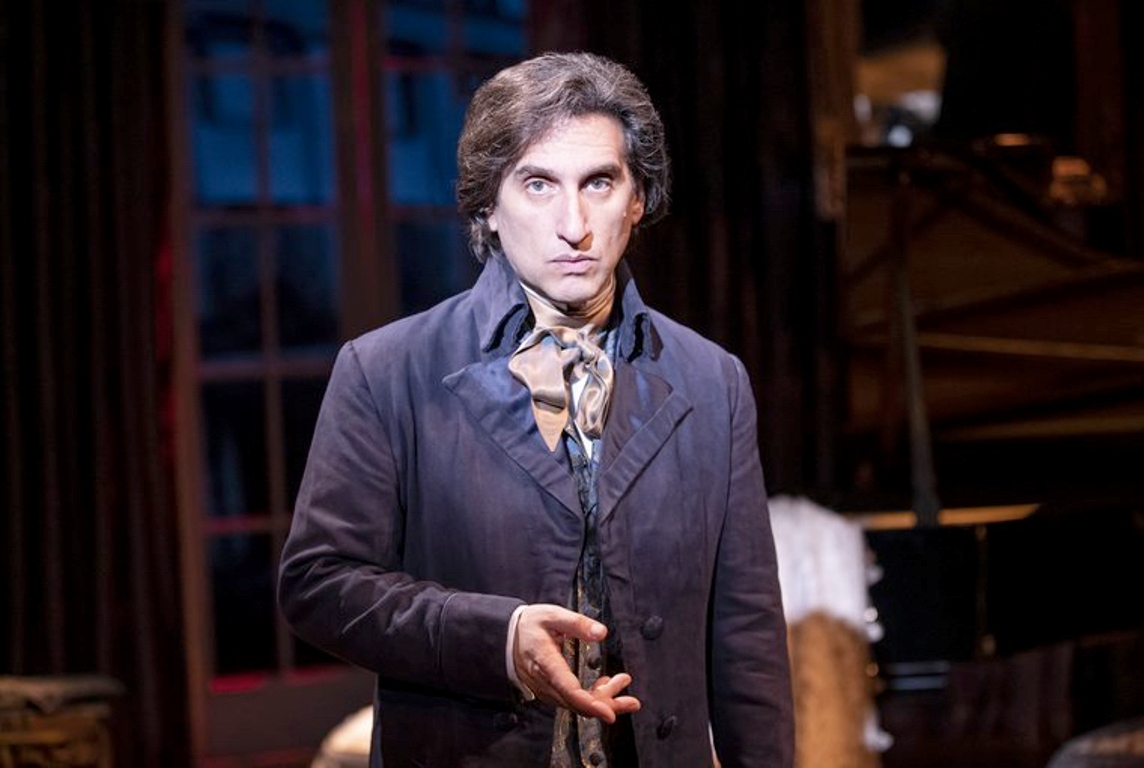MONSIEUR CHOPIN
A Play With Music
Written by and Starring Hershey Felder
Directed by Joel Zwick
59E59 Theatres
Reviewed by David Spencer
Every one of Hershey Felder’s one actor composer-bio plays is something of an event for me, Being both a composer and a dramatist, I experience it with a certain “speaks my language” b. But it’s much more than that. Felder, aside from being a brilliant actor and a brilliant concert pianist, combining those two skills in performance is also, as a dramatist, a master of what I’ll call biographic persona distillation. Taking his shows on aggregate, the four I’ve seen so far anyway, he doesn’t make so much as a pretense at comprehensive biography, even as he may cover a span from birth to death. In any given show, he seems to concentrate on, and intertwine, the one or two threads of emotional need that can operate as a thematic spine…and the musical development that both supports and feeds upon it.
The previous portraits of his that I’ve seen—of Leonard Bernstein, Irving Berlin and George Gershwin—were all of 20th Century American notables who left behind enough of an electronically preserved public profile that their personae could be convincingly replicated. But Monsieur Chopin (which debuted in Chicago in 2005) marks the first time I’ve seen him assay someone whose death preceded all forms of electronic preservation. There is much known about Frédéric Chopin (1810-1849) and his temperament as composer and concert virtuoso, for he was a celebrity and had a high-profile love life (most notable for a tempestuous and ultimately heartbreaking affair with the French novelist best known by her pen name, Georges Sand). And those are of course substantial building blocks for an actor’s portrayal. But from them, a persona must be fashioned. One that may not in fact be replicate the true, we’ll-never-exactly-know, persona of the long-gone subject…but that makes the audience believe that they’re in his presence. And in this, Felder is akin to a magician.
For all that Chopin was often in ill health, often unhappy and died young, Felder presents a Chopin who sees the humor and irony in it. Who revels in the certainty of his ego, the rightness of his musical snobbery and the superiority of the piano over all other instruments—and makes the case. Who’s aware of having been dead for some time. And who—and this is among the more breathtaking parts of the evening—is unafraid to answer audience questions. Felder’s mastery of his subject, his musicianship and, with a dexterity to rival any alumni of Second City, verbal improvisation, answers—as Chopin—the gamut, from serious questions about composition and technique to the frivolous, such as, “What did you think about Cornell Wilde playing you in A Song to Remember?”(To which his response was that he couldn’t take it seriously. “I mean, yes, I was sick and collapsed, but I didn’t throw up ketchup all over the keyboard, it’s disgusting!”)
Monsieur Chopin is gutsy and glorious. I can’t recommend it highly enough.
